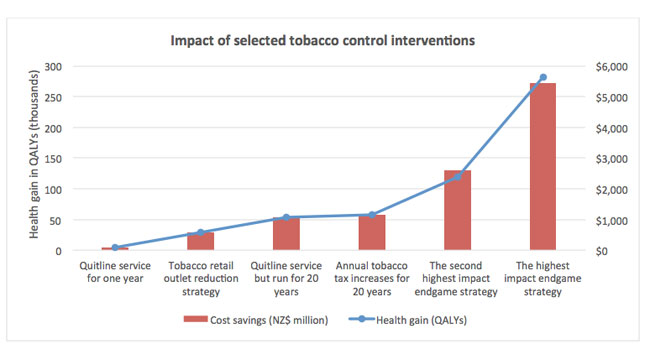 Monday 21 August 2017 10:52am
Monday 21 August 2017 10:52am
Professor Nick Wilson
A new study from the University of Otago, Wellington has found New Zealand's Quitline service is a highly cost-effective way to improve health and even saves the health system money.
The research used New Zealand data and computer modelling to study Quitline promotion in the mass media and the running of the Quitline service.
A year of running Quitline produced 4200 extra years of healthy life in the population and saved the health system $84 million over the remaining lifetimes of the New Zealand population, says one of the study authors Professor Nick Wilson, from the Department of Public Health at the University of Otago, Wellington.
The health benefit was particularly obvious for Māori, with three times greater per capita health gains for Māori than non-Māori.
Professor Wilson says this finding suggests Quitline will be helping reduce health inequalities, as also found with other research on tobacco-control interventions.
“The reality is probably even more favourable for health gain since the modelling only covered the 16 most important tobacco-related diseases and many more diseases are related to smoking.”
“The benefits also include financial savings for smokers who quit and productivity gains associated with workers who don't die prematurely from smoking.”
But Professor Wilson says this research needs to be put into a broader context of what is most effective for reducing smoking.
“Our research suggests that much more health gain would probably be achieved by regular increases in tobacco tax and from various 'tobacco-endgame interventions'.”
These include a sinking lid on tobacco sales, or a package of increasing tobacco tax while also phasing out sales through retail outlets and creating a “tobacco-free generation”.
Some of these types of approaches are detailed in the recently launched Action Plan for achieving Smokefree Aotearoa by 2025.
Action Plan for achieving Smokefree Aotearoa by 2025.
Furthermore, some of these measures might become more effective as e-cigarettes become a more viable alternative, particularly if higher tobacco taxes make e-cigarettes a far cheaper option, Professor Wilson says.
“We would recommend that the Government continues to fund improvements to the Quitline and other cessation services – but also would strongly encourage work on endgame strategies to ensure that New Zealand's Smokefree goal is achieved by 2025.”
“These strategies are likely to deliver more health benefits and also save far more taxpayer dollars than the more incremental steps being currently taken to reduce smoking,” he says.
Key numbers to give context
Table: Comparison of the results from this study with other modelled tobacco control interventions for NZ (see the published journal article for extra details)
| Tobacco control intervention | Health gain in healthy years of life* | Cost savings (NZ$ million) |
|---|---|---|
| This current study – package of mass media and Quitline service for one year of routine operation. | 4200 | $84 |
| The most effective of five tobacco retail outlet reduction strategies that we have previously modelled in a published paper. | 28,900 | $584 |
| This current study – package of mass media and Quitline service but run for 20 years (instead of just one year as in the base model). | 54,100 | $1070 |
| Annual tobacco tax increases for 20 years (previously published work). | 57,000 | $1160 |
| The second highest impact endgame strategy (a combination of tax increases, substantial outlet reduction and the “tobacco-free generation strategy”) (previously published work and see the Figure below). |
119,000 | $2600 |
| The highest impact endgame strategy: a sinking lid on tobacco supply (down to zero in 2025; year of the NZ Government's smokefree goal). (Previously published work and see the Figure below). |
282,000 | $5430 |
* A simplification of quality-adjusted life-years that are calculated in the modelling work.

Abstract of the article published in the international journal Tobacco Control
A related blog on this study is at the Public Health Expert website.
For further information and a copy of the full article:
Professor Nick Wilson
Department of Public Health
University of Otago, Wellington
Email: nick.wilson@otago.ac.nz
A list of Otago experts available for media comment is available elsewhere on this website.
Electronic addresses (including email accounts, instant messaging services, or telephone accounts) published on this page are for the sole purpose of contact with the individuals concerned, in their capacity as officers, employees or students of the University of Otago, or their respective organisation. Publication of any such electronic address is not to be taken as consent to receive unsolicited commercial electronic messages by the address holder.
